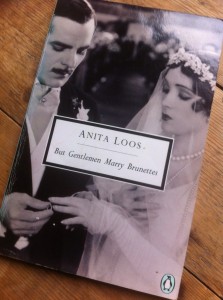Secondhand bookshops really are the most wonderful things, especially for those, like me, with brains but not brass. It is like being allowed into a salon filled with the greatest minds of our age (Faulkner, Shakespeare, McEwan) whose thoughts you can share for not much more than a hundred pennies.
I wandered in to one such emporium today looking for a sequel. Mr Andrew Millar (who apparently looks uncannily like Rita Tushingham in real life) and some of the other professional readers and writers on his excellent podcast Backlisted said that Gentlemen Prefer Blondes was possibly The Great American Novel, at least a fascinating counterpart to The Great Gatsby, and if Gentlemen Prefer Blondes was the bestselling American novel of 1925, who am I to disagree with the American book-buying public? Anyway I had read and very much enjoyed Gentlemen Prefer Blondes, quite the page-turner and I had no difficulty in finishing it at all, which was a relief because I must say that Mr Millar gets quite cross when people do not finish books they do not like, and I have to say that I think that even I, with my brains, would struggle to finish some of the books that he and his friend Mr John ‘Mitch’ Inson wax lyrical about from time to time.
Reader, you cannot imagine the joy that filled me when, sandwiched between a dozen Alexander McCall Smiths (the proprietor seems only to be on nodding terms with the alphabet), there sat, shyly, a copy of the very sequel to the prequel I had found in this very shop a few weeks previously. Though they have now had the two books by the Loos kind of Anita, it occurred to me that I have never seen a book in there by the other Anita, Brookner (after whom the Brookner Prize is so named.) It is not as if Miss Brookner did not write very many novels, they say she wrote one every summer so as to avoid sunlight, so why do they never have any of them in the shop? I mean, Miss Donna Tartt seems to be just as good at avoiding sunlight and yet somehow manages only to write one book every decade and yet they always have plenty of her novels in this particular shop.
And then I began to wonder if the reason I never find any of Miss Brookner’s books (nor Jane Gardam and scarcely never any of Miss Muriel Sparks’s either) is that they are just too good and people hang on to them. Which means that then most of the books in the secondhand bookshop must, by definition be, at the very best, unwanted if not, at worst, not very good at all. I wondered that as I scanned the shelves crammed with what looked like the complete works of Ian McEwan, Alexander McCall Smith and three identical copies of The Life of Pi. But then there also were orphaned books I love and would have taken home had I not already given home to their identical twins: two copies of The Riddle of the Sands, two copies of The Owl Service, a battered copy of A Fraction of the Whole.
I suppose it just comes down to the fact that one man’s trash is another man’s Treasure Island.

